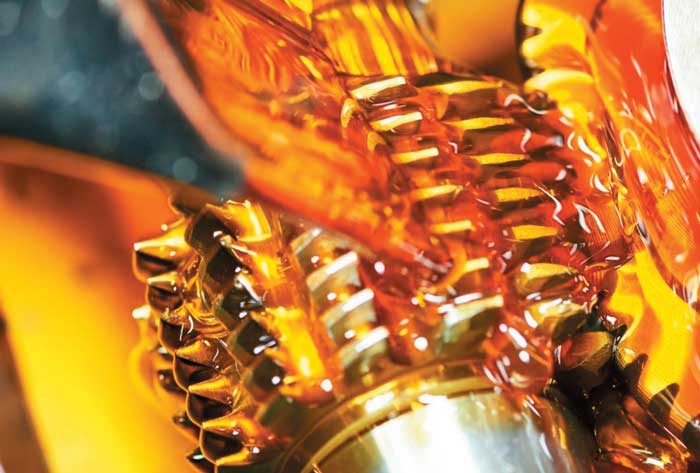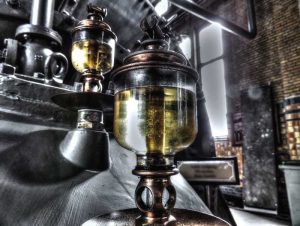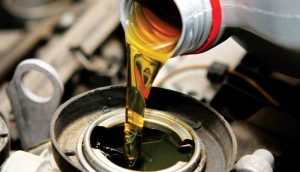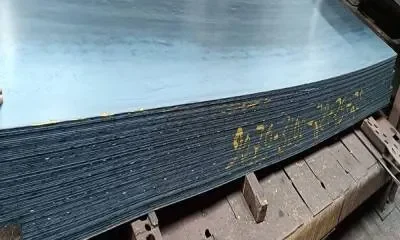Economy & Market
Boosting Productivity
Published
2 years agoon
By
admin
ICR delves into how advanced industrial lubricants are changing the game for the cement sector by enhancing the performance and longevity of heavy machinery and improving the productivity of cement plants.
Lubricants play a pivotal role in the cement industry, ensuring the smooth and efficient operation of machinery involved in the production process. Cement manufacturing is a rigorous process that involves heavy machinery operating under extreme conditions such as high temperatures, heavy loads, and dusty environments. Effective lubrication is critical to maintain the functionality and longevity of this equipment.
Fortune Business Insights states that the global industrial lubricants market was valued at US$ 71.55 billion in 2023 and is projected to be worth US$ 74.05 billion in 2024 and reach US$ 96.93 billion by 2032, exhibiting a CAGR of 3.3 per cent during the forecast period. Lubricants that are used for industrial applications are considered industrial lubricants.
According to Custom Marketing Insights, India Industrial Lubricants Market is valued at US$ 13,045 million in 2024 and is expected to reach US$ 20,715 million by 2033, at a CAGR of 4.12 per cent during the forecast period 2024- 2033.
One of the primary functions of lubricants in the cement industry is to reduce friction between moving parts. This reduction in friction minimises wear and tear, thus extending the lifespan of machinery and reducing the frequency and cost of repairs. Lubricants also help in dissipating heat generated by friction, which is crucial for preventing overheating and potential damage to equipment.
In addition to reducing friction and heat, lubricants provide a protective barrier against contaminants such as dust and moisture. This protection is essential in the cement industry, where the dusty environment can lead to abrasive wear and corrosion if machinery is not adequately lubricated.
Proper lubrication also enhances the efficiency of machinery. Well-lubricated equipment operates more smoothly, leading to improved performance and reduced energy consumption. This efficiency not only lowers operational costs but also contributes to the overall productivity of the cement plant.
“We evaluate the cost-effectiveness of different lubricants through a comprehensive analysis. Factors considered include performance metrics, longevity, environmental impact, and overall operational efficiency. Our purchasing decisions prioritise value without compromising on quality or sustainability. Our goal is to strike a balance between cost-effectiveness and performance excellence,” says Amit Mehta, Vice President – Operations, Wonder Cement.
Moreover, advancements in lubricant technology have led to the development of specialised lubricants designed to meet the specific needs of the cement industry. These include high-temperature lubricants, synthetic oils, and environmentally friendly options that offer superior performance and sustainability benefits.

Types of lubricants
Gear oils: They are essential in the cement industry for lubricating the gears found in heavy machinery such as crushers, mills, and kilns. These oils are formulated to withstand high pressures and loads, ensuring smooth and efficient gear operation. They often contain additives to enhance performance under extreme conditions, reducing friction and wear, and providing a protective film that extends the life of gear components.
Hydraulic oils: These are used in the hydraulic systems of cement plants, which power equipment such as conveyors, crushers, and kiln drives. These oils are designed to provide efficient power transfer, corrosion protection, and optimal viscosity under varying temperatures. High-quality hydraulic oils help in minimising wear and tear on system components, reducing the risk of system failures and downtime.
Grease: It is widely used for lubrication in the cement industry due to its ability to stay in place and provide long-lasting protection. It is particularly useful in applications where liquid lubricants might not be retained, such as bearings, seals and gears. Grease is formulated to withstand extreme temperatures, heavy loads and environmental contaminants, making it ideal for the harsh conditions in cement manufacturing.
Specialty lubricants: They include a range of products designed for specific high-performance applications within the cement industry. These can include high-temperature lubricants for kiln operations, synthetic lubricants that offer superior stability and protection, and bio-based lubricants that provide environmentally friendly alternatives. Specialty lubricants are tailored to meet the unique challenges of different processes, ensuring optimal machinery performance and longevity.
Synthetic lubricants: They are engineered to provide enhanced performance over traditional mineral oils. They offer superior thermal stability, oxidation resistance, and protection against wear, making them suitable for the demanding environments of cement manufacturing. Synthetic lubricants are often used in critical applications where equipment reliability and efficiency are paramount, such as in gearboxes, compressors and high-temperature areas.
Each type of lubricant plays a crucial role in ensuring the seamless operation and maintenance of machinery within the cement industry. By selecting the appropriate lubricant for each application, cement plants can achieve greater efficiency, reduced downtime, and extended equipment life.
Lubrication technology and management system
Lubrication technology has advanced significantly, providing the cement industry with sophisticated solutions to enhance equipment performance and longevity. Modern lubricants are formulated with high-quality base oils and advanced additives that improve their ability to reduce friction, dissipate heat, and protect against wear and corrosion. Innovations such as synthetic lubricants offer superior stability and performance under extreme conditions, while bio-based lubricants present environmentally friendly alternatives. Additionally, high-performance additives enhance lubricant capabilities, ensuring optimal operation of machinery under heavy loads and high temperatures typical in cement manufacturing.
A lubrication management system is crucial for ensuring the efficient use of lubricants and the optimal performance of machinery. This system involves regular monitoring and analysis of lubricant conditions, scheduled maintenance, and the strategic application of lubricants to critical components. By implementing a robust lubrication management system, cement plants can predict and prevent equipment failures, reduce downtime, and extend the lifespan of machinery. Advanced systems may include automated lubrication systems that deliver precise amounts of lubricant at controlled intervals, minimising human error and ensuring consistent lubrication.
KB Mathur, Founder and Director, Global Technical Services, says, “A basic requirement is to maintain quality of lubricants and greases manufactured by standard and reputed oil companies. The specification of the oil is therefore to be maintained and oil to be kept in clean condition to avoid any contamination with dust, dirt or moisture. This contamination has to be kept under control for good mechanical maintenance. Any breakdown in cement plant operation is very costly, affecting production.”
“Therefore, it is essential for cement plants to invest in good lubrication practices by having dedicated manpower, doing lubrication, keeping oil clean by use of filtration machines, oil testing laboratory at site, to ensure quality of oil as per specifications and take corrective action, when required,” he adds.
Effective maintenance practices are integral to successful lubrication management in the cement industry. These practices include routine inspections, timely lubrication, and the use of proper techniques and tools. Maintenance staff should be trained to recognise signs of lubricant degradation and machinery wear, and to understand the specific lubrication requirements of different equipment. Predictive maintenance, facilitated by condition monitoring technologies, allows for the early detection of potential issues, enabling preemptive actions to avoid unplanned outages. Regular oil analysis and lubrication audits help in assessing the effectiveness of the lubrication programme and making necessary adjustments to improve performance and reliability.
Together, advanced lubrication technology, a comprehensive lubrication management system, and diligent maintenance practices form the backbone of efficient and reliable operations in the cement industry, leading to enhanced productivity and reduced operational costs.

High performance additives
High-performance additives are essential components in modern lubricants, enhancing their functionality and effectiveness in demanding applications such as those found in the cement industry. These additives are chemical compounds formulated to improve various properties of the base oil, allowing the lubricants to meet specific performance requirements and extend the operational lifespan of machinery.
Lisa Marston, Regional Technical Service Engineer, Cortec Corporation, says, “Cortec has products that serve various needs in lubricating systems. One major category of products is oil additives with contact and vapour phase corrosion inhibitors that are designed to provide enhanced corrosion protection in addition to the lubricating oil itself during long term storage and intermittent operating conditions for gearboxes, steam turbines, pumps, etc. Cortec also offers greases that are formulated with vapour phase corrosion inhibitors, some of which are derived from renewable resources. Additionally, Cortec manufactures general purpose lubricants with corrosion inhibitors that can be used on valve bushings, fasteners, and packing glands, as a few examples. The addition of contact and vapour phase corrosion inhibitors in these products ensures consistent corrosion protection throughout the equipment, even when components may not be in direct contact with the lubricant.”

- Anti-wear additives: These additives form a protective film on metal surfaces, reducing friction and preventing wear and tear under high-pressure conditions. This is crucial in extending the life of gears and bearings in cement machinery.
- Extreme pressure (EP) additives: EP additives are designed to provide additional protection under extreme load conditions. They react with metal surfaces to create a protective layer that prevents welding and scoring of metal parts, ensuring smooth operation in heavy-duty equipment.
- Anti-oxidants: These additives prevent the oxidation of the lubricant, which can lead to the formation of sludge and varnish. By inhibiting oxidation, antioxidants help maintain the lubricant’s viscosity and performance over extended periods, even in high-temperature environments.
- Corrosion inhibitors: Corrosion inhibitors protect metal surfaces from rust and corrosion caused by exposure to moisture and other corrosive agents. This is particularly important in the cement industry, where machinery is often exposed to harsh environmental conditions.
- Detergents and dispersants: These additives keep engines and machinery clean by preventing the formation of deposits and sludge. Detergents neutralise acids formed during the combustion process, while dispersants keep particles suspended in the lubricant, preventing them from clumping together and causing blockages.
- Viscosity index improvers: These additives help the lubricant maintain its viscosity across a wide temperature range. This ensures that the lubricant performs effectively in both high and low temperatures, providing consistent protection and performance.
By incorporating these high-performance additives, lubricants can deliver enhanced protection, efficiency and durability. In the cement industry, where equipment operates under extreme conditions, the use of such advanced lubricants is critical for maintaining operational efficiency, reducing downtime and prolonging the lifespan of expensive machinery.
Sustainability and lubrication
Sustainability has become a critical focus in the cement industry, including the realm of lubrication. Sustainable lubrication practices involve using high-performance, environmentally friendly lubricants, optimising lubricant usage, and ensuring proper disposal and recycling of used lubricants. These practices help minimise environmental impact, improve energy efficiency and reduce waste, aligning with global sustainability goals.
Proper disposal and recycling of used lubricants are essential for minimising environmental pollution and conserving resources. The cement industry, with its substantial lubricant usage, must implement robust procedures for handling used lubricants.
Used lubricants can contain harmful contaminants that pose environmental risks if not disposed of correctly. Cement plants should follow stringent regulations and guidelines for the safe disposal of used lubricants. This typically involves collecting the used lubricants in designated containers and ensuring they are handled by licensed waste management companies that specialise in hazardous waste disposal. These companies treat the used lubricants to neutralise harmful substances before safe disposal, preventing soil and water contamination.
Recycling used lubricants is an effective way to reduce environmental impact and promote sustainability. The recycling process involves collecting used lubricants and subjecting them to re-refining, which removes impurities and restores the lubricants to a usable state. Re-refined lubricants can perform comparably to new lubricants, making them a viable option for reuse in various applications.
The cement industry can contribute to lubricant recycling efforts by partnering with certified recycling facilities. These facilities use advanced technologies to clean and purify used lubricants, converting them into high-quality products that can re-enter the market. This not only reduces the demand for virgin lubricant production but also minimises waste and conserves natural resources.
Incorporating sustainable lubrication practices, including the proper disposal and recycling of used lubricants, helps the cement industry reduce its environmental footprint, enhance operational efficiency, and align with broader sustainability initiatives. By doing so, the industry can contribute to a healthier environment and more sustainable future.
Conclusion
Effective lubrication is essential for the cement industry, ensuring the efficient and reliable operation of machinery under demanding conditions. The use of advanced lubrication technology, including high-performance synthetic and bio-based lubricants, significantly enhances equipment performance and longevity. Implementing a comprehensive lubrication management system, coupled with effective maintenance practices, allows cement plants to minimise downtime, reduce operational costs and extend the lifespan of their machinery.
Sustainability is also a key consideration in lubrication practices. The proper disposal and recycling of used lubricants are crucial for minimising environmental impact and conserving resources.
By following stringent regulations and partnering with certified recycling facilities, the cement industry can effectively manage waste and promote a circular economy. These efforts contribute to a reduced environmental footprint, aligning with global sustainability goals and fostering a healthier environment.
In conclusion, embracing advanced lubrication technology, robust management systems, and sustainable practices not only improves the operational efficiency of cement plants but also supports their commitment to environmental responsibility. By prioritising these aspects, the cement industry can achieve greater productivity and sustainability, paving the way for a more efficient and eco-friendly future.
– Kanika Mathur

SEEPEX introduces BN pumps with Smart Joint Access (SJA) to improve efficiency, reliability, and inspection speed in demanding rock blasting operations.
Designed for abrasive and chemical media, the solution supports precise dosing, reduced downtime, and enhanced operational safety.
SEEPEX has introduced BN pumps with Smart Joint Access (SJA), engineered for the reliable and precise transfer of abrasive, corrosive, and chemical media in mining and construction. Designed for rock blasting, the pump features a large inspection opening for quick joint checks, a compact footprint for mobile or skid-mounted installations, and flexible drive and material options for consistent performance and uptime.

“Operators can inspect joints quickly and rely on precise pumping of shear-sensitive and abrasive emulsions,” said Magalie Levray, Global Business Development Manager Mining at SEEPEX. “This is particularly critical in rock blasting, where every borehole counts for productivity.” Industry Context
Rock blasting is essential for extracting hard rock and shaping safe excavation profiles in mining and construction. Accurate and consistent loading of explosive emulsions ensures controlled fragmentation, protects personnel, and maximizes productivity. Even minor deviations in pumping can cause delays or reduce product quality. BN pumps with SJA support routine maintenance and pre-operation checks by allowing fast verification of joint integrity, enabling more efficient operations.
Always Inspection Ready
Smart Joint Access is designed for inspection-friendly operations. The large inspection opening in the suction housing provides direct access to both joints, enabling rapid pre-operation checks while maintaining high operational reliability. Technicians can assess joint condition quickly, supporting continuous, reliable operation.
Key Features
- Compact Footprint: Fits truck-mounted mobile units, skid-mounted systems, and factory installations.
- Flexible Drive Options: Compact hydraulic drive or electric drive configurations.
- Hydraulic Efficiency: Low-displacement design reduces oil requirements and supports low total cost of ownership.
- Equal Wall Stator Design: Ensures high-pressure performance in a compact footprint.
- Material Flexibility: Stainless steel or steel housings, chrome-plated rotors, and stators in NBR, EPDM, or FKM.
Operators benefit from shorter inspection cycles, reliable dosing, seamless integration, and fast delivery through framework agreements, helping to maintain uptime in critical rock blasting processes.
Applications – Optimized for Rock Blasting
BN pumps with SJA are designed for mining, tunneling, quarrying, civil works, dam construction, and other sectors requiring precise handling of abrasive or chemical media. They provide robust performance while enabling fast, reliable inspection and maintenance.With SJA, operators can quickly access both joints without disassembly, ensuring emulsions are transferred accurately and consistently. This reduces downtime, preserves product integrity, and supports uniform dosing across multiple bore holes.
With the Smart Joint Access inspection opening, operators can quickly access and assess the condition of both joints without disassembly, enabling immediate verification of pump readiness prior to blast hole loading. This allows operators to confirm that emulsions are transferred accurately and consistently, protecting personnel, minimizing product degradation, and maintaining uniform dosing across multiple bore holes.
The combination of equal wall stator design, compact integration, flexible drives, and progressive cavity pump technology ensures continuous, reliable operation even in space-limited, high-pressure environments.
From Inspection to Operation
A leading explosives provider implemented BN pumps with SJA in open pit and underground operations. By replacing legacy pumps, inspection cycles were significantly shortened, allowing crews to complete pre-operation checks and return mobile units to productive work faster. Direct joint access through SJA enabled immediate verification, consistent emulsion dosing, and reduced downtime caused by joint-related deviations.
“The inspection opening gives immediate confidence that each joint is secure before proceeding to bore holes,” said a site technician. “It allows us to act quickly, keeping blasting schedules on track.”
Framework agreements ensured rapid pump supply and minimal downtime, supporting multi-site operations across continents
Concrete
Refractory demands in our kiln have changed
Published
1 week agoon
February 20, 2026By
admin
Radha Singh, Senior Manager (P&Q), Shree Digvijay Cement, points out why performance, predictability and life-cycle value now matter more than routine replacement in cement kilns.
As Indian cement plants push for higher throughput, increased alternative fuel usage and tighter shutdown cycles, refractory performance in kilns and pyro-processing systems is under growing pressure. In this interview, Radha Singh, Senior Manager (P&Q), Shree Digvijay Cement, shares how refractory demands have evolved on the ground and how smarter digital monitoring is improving kiln stability, uptime and clinker quality.
How have refractory demands changed in your kiln and pyro-processing line over the last five years?
Over the last five years, refractory demands in our kiln and pyro line have changed. Earlier, the focus was mostly on standard grades and routine shutdown-based replacement. But now, because of higher production loads, more alternative fuels and raw materials (AFR) usage and greater temperature variation, the expectation from refractory has increased.
In our own case, the current kiln refractory has already completed around 1.5 years, which itself shows how much more we now rely on materials that can handle thermal shock, alkali attack and coating fluctuations. We have moved towards more stable, high-performance linings so that we don’t have to enter the kiln frequently for repairs.
Overall, the shift has been from just ‘installation and run’ to selecting refractories that give longer life, better coating behaviour and more predictable performance under tougher operating conditions.
What are the biggest refractory challenges in the preheater, calciner and cooler zones?
• Preheater: Coating instability, chloride/sulphur cycles and brick erosion.
• Calciner: AFR firing, thermal shock and alkali infiltration.
• Cooler: Severe abrasion, red-river formation and mechanical stress on linings.
Overall, the biggest challenge is maintaining lining stability under highly variable operating conditions.
How do you evaluate and select refractory partners for long-term performance?
In real plant conditions, we don’t select a refractory partner just by looking at price. First, we see their past performance in similar kilns and whether their material has actually survived our operating conditions. We also check how strong their technical support is during shutdowns, because installation quality matters as much as the material itself.
Another key point is how quickly they respond during breakdowns or hot spots. A good partner should be available on short notice. We also look at their failure analysis capability, whether they can explain why a lining failed and suggest improvements.
On top of this, we review the life they delivered in the last few campaigns, their supply reliability and their willingness to offer plant-specific custom solutions instead of generic grades. Only a partner who supports us throughout the life cycle, which includes selection, installation, monitoring and post-failure analysis, fits our long-term requirement.
Can you share a recent example where better refractory selection improved uptime or clinker quality?
Recently, we upgraded to a high-abrasion basic brick at the kiln outlet. Earlier we had frequent chipping and coating loss. With the new lining, thermal stability improved and the coating became much more stable. As a result, our shutdown interval increased and clinker quality remained more consistent. It had a direct impact on our uptime.
How is increased AFR use affecting refractory behaviour?
Increased AFR use is definitely putting more stress on the refractory. The biggest issue we see daily is the rise in chlorine, alkalis and volatiles, which directly attack the lining, especially in the calciner and kiln inlet. AFR firing is also not as stable as conventional fuel, so we face frequent temperature fluctuations, which cause more thermal shock and small cracks in the lining.
Another real problem is coating instability. Some days the coating builds too fast, other days it suddenly drops, and both conditions impact refractory life. We also notice more dust circulation and buildup inside the calciner whenever the AFR mix changes, which again increases erosion.
Because of these practical issues, we have started relying more on alkali-resistant, low-porosity and better thermal shock–resistant materials to handle the additional stress coming from AFR.
What role does digital monitoring or thermal profiling play in your refractory strategy?
Digital tools like kiln shell scanners, IR imaging and thermal profiling help us detect weakening areas much earlier. This reduces unplanned shutdowns, helps identify hotspots accurately and allows us to replace only the critical sections. Overall, our maintenance has shifted from reactive to predictive, improving lining life significantly.
How do you balance cost, durability and installation speed during refractory shutdowns?
We focus on three points:
• Material quality that suits our thermal profile and chemistry.
• Installation speed, in fast turnarounds, we prefer monolithic.
• Life-cycle cost—the cheapest material is not the most economical. We look at durability, future downtime and total cost of ownership.
This balance ensures reliable performance without unnecessary expenditure.
What refractory or pyro-processing innovations could transform Indian cement operations?
Some promising developments include:
• High-performance, low-porosity and nano-bonded refractories
• Precast modular linings to drastically reduce shutdown time
• AI-driven kiln thermal analytics
• Advanced coating management solutions
• More AFR-compatible refractory mixes
These innovations can significantly improve kiln stability, efficiency and maintenance planning across the industry.
Concrete
Digital supply chain visibility is critical
Published
1 week agoon
February 20, 2026By
admin
MSR Kali Prasad, Chief Digital and Information Officer, Shree Cement, discusses how data, discipline and scale are turning Industry 4.0 into everyday business reality.
Over the past five years, digitalisation in Indian cement manufacturing has moved decisively beyond experimentation. Today, it is a strategic lever for cost control, operational resilience and sustainability. In this interview, MSR Kali Prasad, Chief Digital and Information Officer, Shree Cement, explains how integrated digital foundations, advanced analytics and real-time visibility are helping deliver measurable business outcomes.
How has digitalisation moved from pilot projects to core strategy in Indian cement manufacturing over the past five years?
Digitalisation in Indian cement has evolved from isolated pilot initiatives into a core business strategy because outcomes are now measurable, repeatable and scalable. The key shift has been the move away from standalone solutions toward an integrated digital foundation built on standardised processes, governed data and enterprise platforms that can be deployed consistently across plants and functions.
At Shree Cement, this transition has been very pragmatic. The early phase focused on visibility through dashboards, reporting, and digitisation of critical workflows. Over time, this has progressed into enterprise-level analytics and decision support across manufacturing and the supply chain,
with clear outcomes in cost optimisation, margin protection and revenue improvement through enhanced customer experience.
Equally important, digital is no longer the responsibility of a single function. It is embedded into day-to-day operations across planning, production, maintenance, despatch and customer servicing, supported by enterprise systems, Industrial Internet of Things (IIoT) data platforms, and a structured approach to change management.
Which digital interventions are delivering the highest ROI across mining, production and logistics today?
In a capital- and cost-intensive sector like cement, the highest returns come from digital interventions that directly reduce unit costs or unlock latent capacity without significant capex.
Supply chain and planning (advanced analytics): Tools for demand forecasting, S&OP, network optimisation and scheduling deliver strong returns by lowering logistics costs, improving service levels, and aligning production with demand in a fragmented and regionally diverse market.
Mining (fleet and productivity analytics): Data-led mine planning, fleet analytics, despatch discipline, and idle-time reduction improve fuel efficiency and equipment utilisation, generating meaningful savings in a cost-heavy operation.
Manufacturing (APC and process analytics): Advanced Process Control, mill optimisation, and variability reduction improve thermal and electrical efficiency, stabilise quality and reduce rework and unplanned stoppages.
Customer experience and revenue enablement (digital platforms): Dealer and retailer apps, order visibility and digitally enabled technical services improve ease of doing business and responsiveness. We are also empowering channel partners with transparent, real-time information on schemes, including eligibility, utilisation status and actionable recommendations, which improves channel satisfaction and market execution while supporting revenue growth.
Overall, while Artificial Intelligence (AI) and IIoT are powerful enablers, it is advanced analytics anchored in strong processes that typically delivers the fastest and most reliable ROI.
How is real-time data helping plants shift from reactive maintenance to predictive and prescriptive operations?
Real-time and near real-time data is driving a more proactive and disciplined maintenance culture, beginning with visibility and progressively moving toward prediction and prescription.
At Shree Cement, we have implemented a robust SAP Plant Maintenance framework to standardise maintenance workflows. This is complemented by IIoT-driven condition monitoring, ensuring consistent capture of equipment health indicators such as vibration, temperature, load, operating patterns and alarms.
Real-time visibility enables early detection of abnormal conditions, allowing teams to intervene before failures occur. As data quality improves and failure histories become structured, predictive models can anticipate likely failure modes and recommend timely interventions, improving MTBF and reducing downtime. Over time, these insights will evolve into prescriptive actions, including spares readiness, maintenance scheduling, and operating parameter adjustments, enabling reliability optimisation with minimal disruption.
A critical success factor is adoption. Predictive insights deliver value only when they are embedded into daily workflows, roles and accountability structures. Without this, they remain insights without action.
In a cost-sensitive market like India, how do cement companies balance digital investment with price competitiveness?
In India’s intensely competitive cement market, digital investments must be tightly linked to tangible business outcomes, particularly cost reduction, service improvement, and faster decision-making.
This balance is achieved by prioritising high-impact use cases such as planning efficiency, logistics optimisation, asset reliability, and process stability, all of which typically deliver quick payback. Equally important is building scalable and governed digital foundations that reduce the marginal cost of rolling out new use cases across plants.
Digitally enabled order management, live despatch visibility, and channel partner platforms also improve customer centricity while controlling cost-to-serve, allowing service levels to improve without proportionate increases in headcount or overheads.
In essence, the most effective digital investments do not add cost. They protect margins by reducing variability, improving planning accuracy, and strengthening execution discipline.
How is digitalisation enabling measurable reductions in energy consumption, emissions, and overall carbon footprint?
Digitalisation plays a pivotal role in improving energy efficiency, reducing emissions and lowering overall carbon intensity.
Real-time monitoring and analytics enable near real-time tracking of energy consumption and critical operating parameters, allowing inefficiencies to be identified quickly and corrective actions to be implemented. Centralised data consolidation across plants enables benchmarking, accelerates best-practice adoption, and drives consistent improvements in energy performance.
Improved asset reliability through predictive maintenance reduces unplanned downtime and process instability, directly lowering energy losses. Digital platforms also support more effective planning and control of renewable energy sources and waste heat recovery systems, reducing dependence on fossil fuels.
Most importantly, digitalisation enables sustainability progress to be tracked with greater accuracy and consistency, supporting long-term ESG commitments.
What role does digital supply chain visibility play in managing demand volatility and regional market dynamics in India?
Digital supply chain visibility is critical in India, where demand is highly regional, seasonality is pronounced, and logistics constraints can shift rapidly.
At Shree Cement, planning operates across multiple horizons. Annual planning focuses on capacity, network footprint and medium-term demand. Monthly S&OP aligns demand, production and logistics, while daily scheduling drives execution-level decisions on despatch, sourcing and prioritisation.
As digital maturity increases, this structure is being augmented by central command-and-control capabilities that manage exceptions such as plant constraints, demand spikes, route disruptions and order prioritisation. Planning is also shifting from aggregated averages to granular, cost-to-serve and exception-based decision-making, improving responsiveness, lowering logistics costs and strengthening service reliability.
How prepared is the current workforce for Industry 4.0, and what reskilling strategies are proving most effective?
Workforce preparedness for Industry 4.0 is improving, though the primary challenge lies in scaling capabilities consistently across diverse roles.
The most effective approach is to define capability requirements by role and tailor enablement accordingly. Senior leadership focuses on digital literacy for governance, investment prioritisation, and value tracking. Middle management is enabled to use analytics for execution discipline and adoption. Frontline sales and service teams benefit from
mobile-first tools and KPI-driven workflows, while shop-floor and plant teams focus on data-driven operations, APC usage, maintenance discipline, safety and quality routines.
Personalised, role-based learning paths, supported by on-ground champions and a clear articulation of practical benefits, drive adoption far more effectively than generic training programmes.
Which emerging digital technologies will fundamentally reshape cement manufacturing in the next decade?
AI and GenAI are expected to have the most significant impact, particularly when combined with connected operations and disciplined processes.
Key technologies likely to reshape the sector include GenAI and agentic AI for faster root-cause analysis, knowledge access, and standardisation of best practices; industrial foundation models that learn patterns across large sensor datasets; digital twins that allow simulation of process changes before implementation; and increasingly autonomous control systems that integrate sensors, AI, and APC to maintain stability with minimal manual intervention.
Over time, this will enable more centralised monitoring and management of plant operations, supported by strong processes, training and capability-building.

World Cement Association Annual Conference 2026 in Bangkok

Assam Chief Minister Opens Star Cement Plant In Cachar

Adani Cement, NAREDCO Form Strategic Alliance

Walplast’s GypEx Range Secures GreenPro Certification

Smart Pumping for Rock Blasting

World Cement Association Annual Conference 2026 in Bangkok

Assam Chief Minister Opens Star Cement Plant In Cachar

Adani Cement, NAREDCO Form Strategic Alliance

Walplast’s GypEx Range Secures GreenPro Certification

Smart Pumping for Rock Blasting
Trending News
-

 Economy & Market4 weeks ago
Economy & Market4 weeks agoBudget 2026–27 infra thrust and CCUS outlay to lift cement sector outlook
-

 Economy & Market4 weeks ago
Economy & Market4 weeks agoFORNNAX Appoints Dieter Jerschl as Sales Partner for Central Europe
-

 Concrete1 month ago
Concrete1 month agoSteel: Shielded or Strengthened?
-

 Concrete1 week ago
Concrete1 week agoRefractory demands in our kiln have changed















